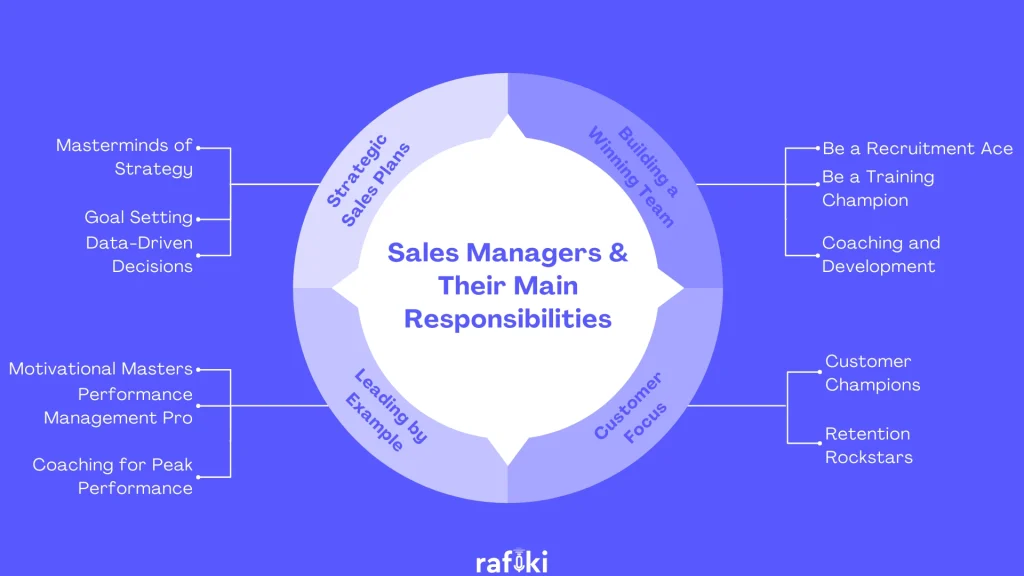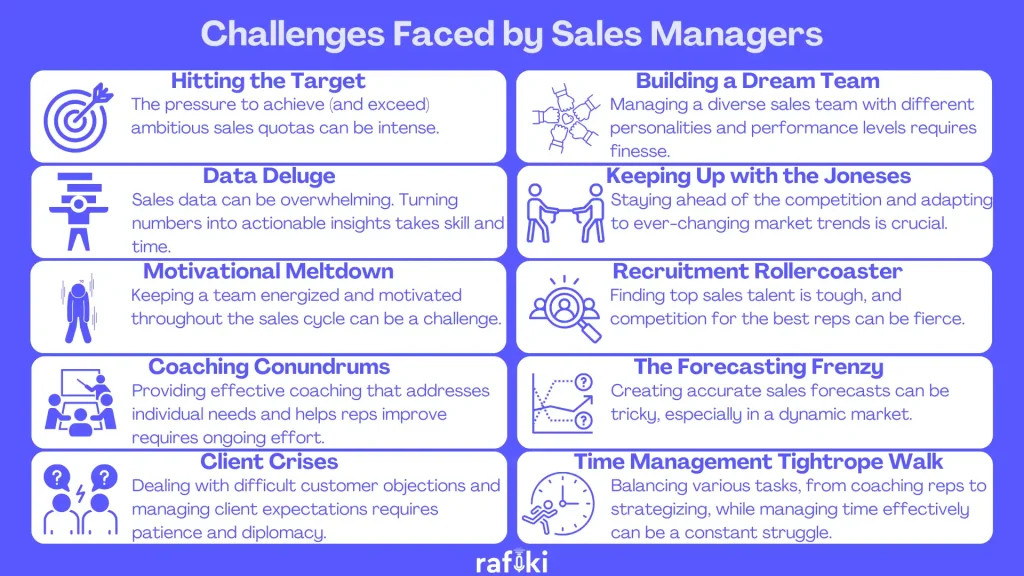Why Rafiki
Pricing


Pricing
Solutions

RevOps Leaders
Synchronize revenue generating functions

SDR Leaders
Get your team aligned and Coach your Reps 3x faster at scale

Sales Leaders
Unlock pipeline truth, drive confident forecasts

The world of sales is a thrilling battlefield, and behind every successful company lies skilled strategists: the sales managers. These are the revenue rockstars who lead and motivate their teams to consistently crush sales quotas. But what exactly does a sales manager job description entail?
This comprehensive guide dives deep into the exciting world of sales management, unpacking the role's responsibilities, the challenges it presents, and the key skills required to excel. We'll also explore the differences between B2B and B2C sales management, and equip you with the knowledge to become a true sales management master.
Let’s dive in!
Imagine a company as a well-oiled machine, selling out its every product and service. The sales manager is the engine that keeps this machine humming. They oversee a team of salespeople, guiding them in their quest to convert leads into loyal customers.
But a sales manager's job description goes beyond just managing people. They are strategic thinkers, crafting winning sales plans aligned with company objectives. They are data analysts, interpreting sales figures to identify trends and opportunities. And finally, they are also motivators, keeping their team energized and focused on achieving ambitious sales goals. In essence, sales managers are the glue that holds the sales force together, ensuring everyone is working collaboratively towards a common goal: driving revenue and propelling the company forward.
Below is the job description of a sales manager by some of the top companies world-wide:

As you can see, a sales manager's day-to-day tasks are a whirlwind of strategic planning, team leadership, and customer focus. Let’s crystallize the above job descriptions and look at the key responsibilities:
So, to recap, here are the main responsibilities of sales managers:

Rafiki, a conversation intelligence platform, can be a valuable tool for sales managers in several aspects of these core responsibilities. For instance, Rafiki's Smart Call Summary can automatically generate summaries of sales calls, capturing key customer talking points and next steps, allowing managers to focus on coaching and strategy instead of listening to call recordings for hours and taking notes.
The exciting world of sales management can be further divided into two distinct categories: B2B (business-to-business) and B2C (business-to-consumer). While both roles share core responsibilities, the specific challenges and approaches differ.
B2B sales managers typically navigate complex sales cycles involving multiple decision-makers. They may need to craft highly targeted sales presentations and proposals to convince various stakeholders within a company. Strong negotiation skills and a deep understanding of the B2B landscape are crucial for success.
In contrast, B2C sales managers focus on high sales volume and understanding consumer behavior. They may implement strategies to maximize sales through various channels, analyze customer buying patterns, and leverage data to personalize outreach messages.
Before we dive into how to become a highly effective sales manager, let’s first set the context by looking at the most common challenges a sales manager will encounter:

So, you're up for the challenge and eager to become a sales management master? Here are some key skills that will set you apart and propel you towards sales leadership success:
Rafiki's Smart Call Scoring objectively analyzes rep performance on each call. This data can be incredibly useful for coaching conversations, allowing you to identify areas where reps excel and pinpoint specific skills that need development.
Beyond these core competencies, effective sales managers also possess:
Sales managers are the unsung heroes of the business world. Their expertise in building high-performing teams, crafting strategic sales plans, and fostering strong customer relationships has a ripple effect throughout the entire organization.
Effective sales management directly translates to increased revenue and fuels company growth. Sales managers ensure a steady stream of new customers while retaining existing ones, contributing significantly to the company's financial health and overall success. But the impact goes beyond just numbers. Sales managers create a positive, results-oriented work environment, motivating their teams and fostering a culture of continuous improvement. For aspiring leaders with a passion for guiding and inspiring others, a career in sales management offers a rewarding path brimming with opportunities for growth and development.
The world of sales beckons! If you're a driven individual who thrives in a fast-paced environment and enjoys motivating others to achieve success, sales management might be your perfect career fit. This comprehensive guide has equipped you with the knowledge and essential skills to navigate the exciting world of sales leadership.
So, are you ready to step up and become the sales management rockstar your company needs?
Explore how Rafiki can help you become the most effective sales manager by signing up for a free 14 day trial!
Become The Most Effective Sales Manager